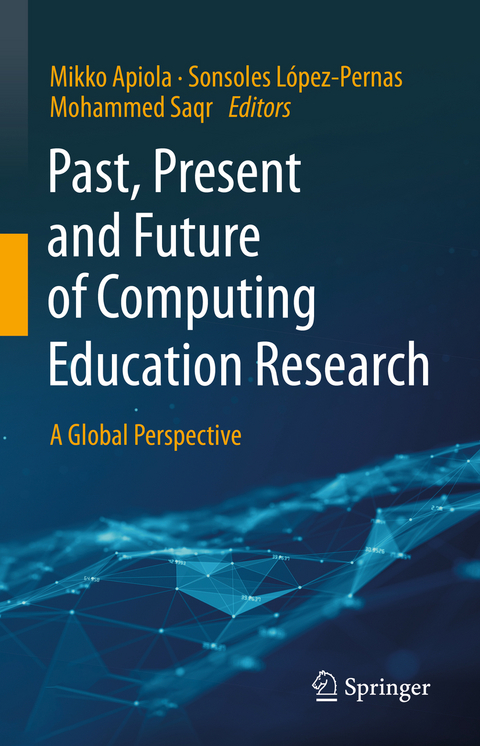
Past, Present and Future of Computing Education Research
Springer International Publishing (Verlag)
978-3-031-25335-5 (ISBN)
lt;b> Mikko Apiola received the Ph.D. degree in computer science from the University of Helsinki, Finland. He has worked in IT industry and in several teaching and research positions in Finnish universities. He is currently an Adjunct Professor at the School of Computing in University of Eastern Finland, and at the Department of Computing in University of Turku, Finland. His research interests include computing education research, educational technology, and ICT for development (ICT4D).Sonsoles López-Pernas received the bachelor's and master's degrees in telecommunications engineering and the Ph.D. degree in telematics engineering from the Universidad Politécnica de Madrid (UPM). Since 2015, she has been working as a Researcher with the Next Generation Internet Group (GING) in UPM. She currently works as a senior researcher at the University of Eastern Finland. Her research interests include learning analytics, technology enhanced learning, computer science education, and bibliometrics.Mohammed Saqr received the Ph.D. degree in learning analytics from Stockholm University, Sweden. He currently works as a Senior Researcher at the University of Eastern Finland, in artificial intelligence, big data in education, network science, and scientometrics. He is particularly interested in research methods, including network analysis, temporal networks, machine learning, process, and sequence mining as well as temporal processes in general. He is also an active member of several scientific organizations and acts as an academic editor in leading academic publications.
Chapter. 1. Exploring the Past, Present and Future of Computing Education Research: An Introduction.- Chapter. 2. What is Computing Education Research (CER)?.- Chapter. 3. Theory and Approaches to CER.- Chapter. 4. The Evolution of CER: A Meta-Analytic Perspective.- Chapter. 5. Scientometrics: A concise introduction and a detailed methodology for the mapping of the scientific field of computing education.- Chapter. 6. The Hands that Made Computing Education Research: Top Authors, Networks, Collaboration and Newcomers.- Chapter. 7. The Venues That Shaped Computing Education Research: Dissemination Under the Lens.- Chapter. 8. The Evolving Themes of Computing Education Research: Trends, Topic Models, and Emerging Research.- Chapter. 9. Capturing The Impact and The Chatter around Computing Education Research Beyond Academia in Social Media, Patents, and Blogs.- Chapter. 10. A Scientometric Perspective on the Evolution of the SIGCSE Technical Symposium: 1970-2021.- Chapter. 11. ITiCSE Working Groups As an Engine for Community-Building.- Chapter. 12. A Case Study: The Uppsala Computing Education Research Group (UpCERG).- Chapter. 13. Future Technology Lab: A plug-in Campus as an agent of change for Computing Education Research in the Global South.- Chapter. 14. CER in Baltic Countries.- Chapter. 15. CER in the Global South.- Chapter. 16. Computing Education Research inFinland.- Chapter. 17. CER in Australasia.- Chapter. 18. Computer Science Education Research in Israel.- Chapter. 19. CER in the UK & Ireland.- Chapter. 20. CER in schools.- Chapter. 21. Conceptualizing Approaches to CriticalComputing Education: Inquiry, Design, and Reimagination.
| Erscheinungsdatum | 19.04.2023 |
|---|---|
| Zusatzinfo | XXIII, 538 p. 71 illus., 61 illus. in color. |
| Verlagsort | Cham |
| Sprache | englisch |
| Maße | 155 x 235 mm |
| Gewicht | 1003 g |
| Themenwelt | Schulbuch / Wörterbuch ► Unterrichtsvorbereitung ► Unterrichts-Handreichungen |
| Mathematik / Informatik ► Informatik | |
| Schlagworte | bibliometrics • Computer Science • Computer Science Education • Computer science education research • computing education • Computing education research • Education • Educational Data • Education research • History of Computing • History of computing education • Large-scale analyses • Learning Analytics • Meta-review • programming education • Review • Science Mapping • Scientometrics • software engineering education • Technology Ethics |
| ISBN-10 | 3-031-25335-3 / 3031253353 |
| ISBN-13 | 978-3-031-25335-5 / 9783031253355 |
| Zustand | Neuware |
| Haben Sie eine Frage zum Produkt? |
aus dem Bereich


